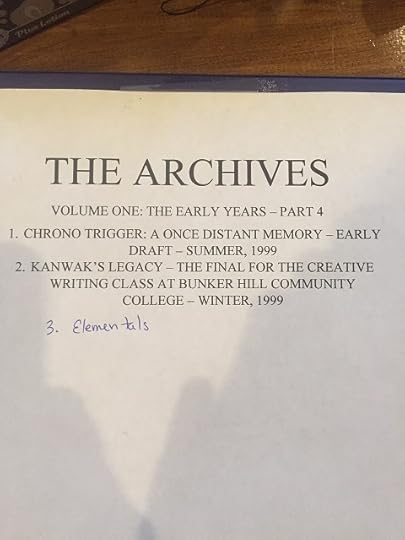A Once Distant Memory
This past week I finally grabbed procrastination by the coattails and chucked him out the window. In doing so I finally accomplished something that had been on my to-do list for some time.
A few days ago I took down one of the big three-ring spiral binders and cracked it open. The binder is one of about thirty, which chronicles my writing career from my first short story at about the age of seven, all the way on up to today. Even my dissertation, hardly recreational reading, is there.
The three ring binder in question contained my summer portfolio. The date ‘1999-2000’ stares back at me. I was 20, 21 then. Looking back, I realize that I had accepted a job at a gas station that was practically void of people so I could write in notebooks and not be bothered by anyone. This was in the days before 9/11; before the days when I got married and had responsibilities that came first. And I was attending Bunker Hill Community College, in Charlestown, Massachusetts.

One of the Archives – Final Portfolio for my winter, 1999 class.
Reading the first few short stories, neither of which were published, I find myself flustered. This is what I thought was good writing back then? Back then, the idea was treasured over the delivery method. One of the first short stories was little more than flash fiction: a man suffering from writer’s block is surprised when his typewriter starts churning out his next bestseller. Instead of being happy, however, he starts writing a story about – you got it, a man with writer’s block whose typewriter starts churning out a story. I am not sure where the inspiration comes from – it is possible I read a Harlan Ellison story about a writer suffering from block and waking up to hear gremlins (literally) writing his stories for him. Maybe it was inspired by Stephen King.
Instead of pushing the story aside, I did what I thought was best for the story: I rewrote it.
Back when I was a kid, a first draft was ‘good enough.’ I didn’t have the experience, the ability to edit what I was writing. That wouldn’t come until later, when I started reading about editing rather than writing. What I was doing instead was rewriting, rather than revisioning the story and thinking about ways it could be a tighter narrative.
When I was done, the story remained the same, but the narrative was very different. The 700-word bloated monster was a 400-word story that had all the excess trimmed from it. I waited a day, looked it over again, and submitted it to a magazine.
My desire to write stories stemmed not from my father, who was a newspaper editor, but from a group of several teachers, particularly Tim Teelin, who first introduced me to the world of Ray Bradbury when I was ten. It was as if someone had turned on a faucet. After reading ‘The Jaws Log’ about how the creators of the movie Jaws wanted to train a great white shark, I had an idea about a film director who wanted a T-Rex for his next movie, but winds up becoming dinner. I wrote this story considerably later, and it is in the three-ring-binder I mention here.
There are other stories in this particular compendium. Some of them are just echoes of ideas that I started but ended differently than I would have today. What it reveals is my fascination with clones (which, I might add, might have stemmed from being a possible twin in the womb, but that was never proven). One story was about a girl whose parents were so sick of her temper-tantrums that they had her cloned and programmed to be docile. Another is about a man whose career is in defending clones accused of capital crimes due to their being treated as slaves. Most of these were written between drafts of what eventually became ‘For None of Woman Born.’

The full Archives – over 25,000 pages, including novels, short stories, and published articles. At least twelve novels were lost in a hard disk crash. A friend lost the drive before the stories could be recovered.
In this long and winded entry, what I am trying to say is, don’t dismiss your early drafts of work. Save them. Cherish them. You can be as morbid as I: I have saved all of my rejection letters since I was about eighteen. In doing so you provide yourself with a legacy, and a chance for friends and family, and perhaps historians, to chart your progress. Not to mention yourself.



